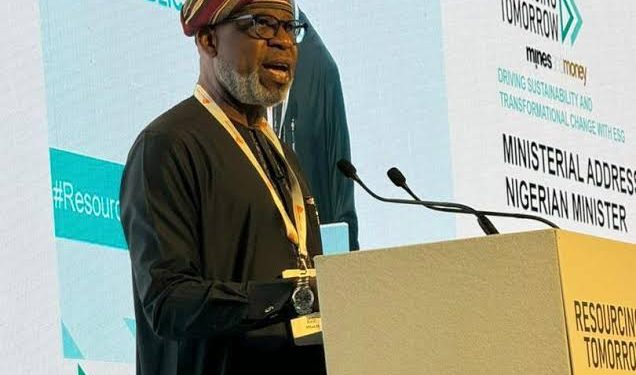The Federal Government has announced plans to revoke additional mining licences as part of its ongoing effort to protect genuine investors from fraudsters and speculators.
The Director-General of the Mining Cadastre Office (MCO), Obadiah Nkom, disclosed this during a three-hour live session on X (formerly Twitter) themed “A Deep Dive into the Mining Cadastre Office: Driving Transparency and Order in Nigeria’s Solid Minerals Sector.”
According to Nkom, the clean-up exercise—which targets expired, speculative, and inactive licences—is designed to free up space for serious investors and ensure compliance with Nigeria’s mining laws.
He revealed that the Ministry of Solid Minerals Development, under Dr. Dele Alake, had already revoked 4,709 mineral licences, comprising 1,400 expired titles, 2,338 refused applications, and 971 notifications of grant where applicants failed to pay mandatory fees.
“This cleaning exercise is not punitive. It is part of a deliberate effort to weed out speculators hoarding licences without adding value to the economy,” Nkom explained. “Imagine 4,709 titles erased from the system. This has sanitised the sector and boosted investor confidence. Those who are not committed to exploration and value addition will face consequences.”
Nkom also raised alarm over the activities of impostors posing as staff or agents of the Mining Cadastre Office to defraud unsuspecting investors. He confirmed that the agency had lodged complaints with the Department of State Services (DSS) and the Economic and Financial Crimes Commission (EFCC) to prosecute offenders.
“We are going to bite, and bite hard. These impersonators collect money and documents illegally, tarnishing the image of the sector. That era is over,” he warned.
To further strengthen investor protection, the MCO has integrated with the Corporate Affairs Commission’s (CAC) real-time verification system, ensuring that only duly registered companies with verifiable financial capacity can obtain mineral titles. Applicants are now required to provide CAC verification, bank statements, and letters demonstrating financial capability.
Legal Compliance and Transparency
Nkom clarified that holding a valid licence does not give operators the right to mine minerals outside their approved scope. “Mining beyond your licensed mineral automatically renders you an illegal miner,” he cautioned, while noting that the law allows operators to apply within weeks to add newly discovered minerals to their licences.
He stressed that MCO’s reforms had achieved 100 per cent litigation success, a record he attributed to the agency’s strict adherence to the Nigerian Minerals and Mining Act, 2007.
Despite the revocation exercise, Nkom noted an increase in both foreign and local investor interest in Nigeria’s mining sector. Small-scale miners are reportedly organising into cooperatives, while international companies are exploring opportunities in gold, lithium, barite, coal, and other minerals.
Nigeria is home to over 44 mineral resources spread across 500 locations nationwide, yet the sector contributes less than 1% to the country’s Gross Domestic Product (GDP). Analysts say the ongoing reforms—targeting racketeering, licence hoarding, and illegal mining—could help unlock the sector’s full potential and reposition it as a major driver of economic growth under the Tinubu administration.
“The mineral sector is no longer what it used to be. We are repositioning it for the growth of Nigeria,” Nkom affirmed










